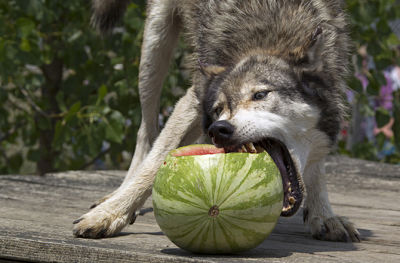Food for vegetarian dogs? yes or no?
 I can agree with the opinion of many owners in which dog food is often made from low quality raw materials: in many cheap brands they use animal by -products such as peaks, feathers, bones, etc.. But not all brands make their feet with poor quality raw materials. There are brands such as Acana, Lobo Azul or Taste of the Wild (to mention only a few) that use high quality ingredients in all their feed. Many brands market food for vegetarian dogs and feed without cereals. In addition, if we do not want to use think for dogs, because we believe it is full of additives and other chemicals, we always have the option of cooking our dogs, pasta and vegetables. The dog feed was born as a matter of convenience, but if the dog does not have specific health problems that require special diets and we have the time, money and knowledge to give it a “home” food, welcome! Of course, it must be a balanced meal, fat -free and condiments, making your food yourself, does not mean that you can eat like your meat with barbecue sauce.
Another issue that must be taken into account is the concept of "natural." The dog's life as we know it today is very unnatural, is it natural for a living animal at home? Well, if we were talking about the wolves, of course, I would say no, but we know that the dog was the first animal to be domesticated, so it seems logical that the dog lives with human beings. Another thing argued by the defenders of food for vegetarian dogs is that vegetables and fruits provide the same nutrients as products of animal origin. In my opinion, this is not true, however, even based on the fact that this statement was true, if you stop to read the labels of vegetarian feeds, you can see that to avoid vitamin and mineral deficiencies, many supplements are included. It is logical to think that a complete and balanced food should not need so many supplements. This is because this type of food lacks certain nutrients necessary for the dog. Therefore it is not natural. These are just some of the doubts posed by vegetarian nutrition for a dog. For my part, I maintain that in most cases it cannot be avoided by giving animal protein to the dog, except in specific cases of intolerances and seriously proven allergies, but this must be determined by the veterinarian. The important thing is to avoid giving our dogs a vegetarian diet without consulting a veterinarian before. We must make sure that what we feed our dog is good for him. Other articles that can be of interest:
I can agree with the opinion of many owners in which dog food is often made from low quality raw materials: in many cheap brands they use animal by -products such as peaks, feathers, bones, etc.. But not all brands make their feet with poor quality raw materials. There are brands such as Acana, Lobo Azul or Taste of the Wild (to mention only a few) that use high quality ingredients in all their feed. Many brands market food for vegetarian dogs and feed without cereals. In addition, if we do not want to use think for dogs, because we believe it is full of additives and other chemicals, we always have the option of cooking our dogs, pasta and vegetables. The dog feed was born as a matter of convenience, but if the dog does not have specific health problems that require special diets and we have the time, money and knowledge to give it a “home” food, welcome! Of course, it must be a balanced meal, fat -free and condiments, making your food yourself, does not mean that you can eat like your meat with barbecue sauce.
Another issue that must be taken into account is the concept of "natural." The dog's life as we know it today is very unnatural, is it natural for a living animal at home? Well, if we were talking about the wolves, of course, I would say no, but we know that the dog was the first animal to be domesticated, so it seems logical that the dog lives with human beings. Another thing argued by the defenders of food for vegetarian dogs is that vegetables and fruits provide the same nutrients as products of animal origin. In my opinion, this is not true, however, even based on the fact that this statement was true, if you stop to read the labels of vegetarian feeds, you can see that to avoid vitamin and mineral deficiencies, many supplements are included. It is logical to think that a complete and balanced food should not need so many supplements. This is because this type of food lacks certain nutrients necessary for the dog. Therefore it is not natural. These are just some of the doubts posed by vegetarian nutrition for a dog. For my part, I maintain that in most cases it cannot be avoided by giving animal protein to the dog, except in specific cases of intolerances and seriously proven allergies, but this must be determined by the veterinarian. The important thing is to avoid giving our dogs a vegetarian diet without consulting a veterinarian before. We must make sure that what we feed our dog is good for him. Other articles that can be of interest:
Share
